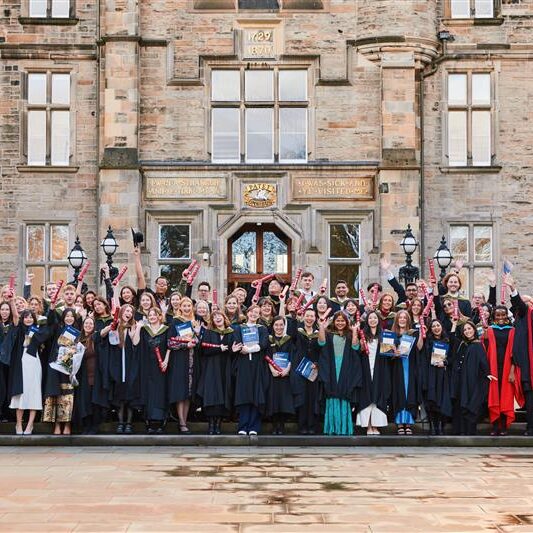Navigate complex new technical systems and roles with transparency, accountability, fairness, justice, and respect for human rights.
This programme meets the urgent demand for interdisciplinary skills and knowledge in the ethical design, use, and governance of artificial intelligence and other data-intensive technologies.
Many organisations lack the expertise needed to answer society’s demands for responsible technology use, which increasingly goes beyond legal compliance or risk management.
Our interdisciplinary degree is designed with the University of Edinburgh’s world-leading academic expertise in this area, drawing on the fields of philosophy, law, informatics, and science and technology innovation studies (STIS).
The degree leverages research excellence from the Futures Institute’s Centre for Technomoral Futures, which blends technical and moral expertise in new models of research, education, design and engagement that directly serve the goals of sustainable, just and ethical innovation.
Over the course of this programme, you will develop the knowledge and expertise to shape how AI and data are developed and governed, contributing to a future where innovation is both responsible and sustainable.
We regularly review and enhance our degree programmes to ensure they deliver the best possible student experience. As part of this process, we are currently reviewing Edinburgh Futures Institutes postgraduate portfolio and expect to confirm any updates in April. While this review is underway, entry to part-time, online, and PgCert/PgDip pathways is paused. Applications remain open for our full-time, on-campus MSc programmes.
We remain fully committed to offering a wide range of flexible postgraduate opportunities, and we look forward to welcoming students to our refreshed programmes very soon.
Professor Shannon Vallor is the Baillie Gifford Chair in the Ethics of Data and Artificial Intelligence at the Edinburgh Futures Institute, she is also a Professor in the School of Philosophy, Psychology and Language Sciences. She is Director of the Centre for Technomoral Futures, and co-Director of the BRAID (Bridging Responsible AI Divides) programme.
Find out more
Milo Phillips-Brown is a lecturer in the Philosophy of Technology in the School of Philosophy, Psychology and Language Sciences.
Find out more
“Our interdisciplinary degree draws from the University’s world-leading expertise in the ethics of data and AI. It leverages the research power of the Futures Institute’s Centre for Technomoral Futures, which promotes sustainable, just and responsible technology and meets the growing demand for ethical skills in the AI and data workforce.”
Professor Shannon Vallor, Programme Director of MSc Data and AI ethics, Edinburgh Futures Institute and Director of the Centre for Technomoral Futures
This programme is part of our interconnected postgraduate study options, focused on complex global and social challenges.
You will learn from academic experts from different subject areas. You will develop creative, critical and data-informed thinking that cuts across traditional academic boundaries. You will have the space to think deeply about questions linked to your own passions and professional goals, and to develop a final project based on an issue that you care about.
What you will learn:
- Data skills: learn to collect, manage, use and analyse data ethically. Note, this programme does not require pre-existing data skills or qualifications.
- Complex cognitive and collaborative skills: what you need to become knowledgeable and competent in responsible and ethical data and AI development, use and governance.
- Understanding of the ethical, legal, policy and design values, principles and practices that enable responsible use of data and AI.
- Practical experience: you will work and communicate about AI and data ethics with other stakeholders and practitioners across sectors, disciplines and publics
- How ethics intersects with other forms of technology governance such as law, policy, design and professional standards. And how ethics relates to broader political and cultural contestations of algorithmic, corporate and state power and influence
- Creative problem solving and specialist skills: use innovative, collaborative, analytic, and creative approaches to communicating and understanding issues, and developing creative opportunities and solutions.
- Cross-disciplinary insights: to help you approach challenges and issues from multiple perspectives.
This programme is designed for proactive and motivated students passionate about tackling real-world issues. You’ll graduate equipped to work on complex problems that require critical thinking, novel approaches, teamwork, and collaboration. This programme is for recent graduates and career professionals from a diverse range of backgrounds, areas of study and skill sets.
Programme highlights
You’ll study a range of compulsory and optional courses, along with a final project, to complete 180 credits.
These courses are specific and tailored to your programme of study, exploring areas such as:
- an exploration of the intersection of AI with law, ethics, policy and other modes of technology governance in a rapidly changing context
- case studies that explore the challenges of ethical data practice while providing methodologies to work with others to meet these challenges in a range of sectors
You will choose from a range of topics taught by staff from different discipline areas, including those associated with your programme. The exact courses offered vary from year to year. Optional courses from the postgraduate portfolio cover a range of themes and topics, including:
- data, programming and research skills that build on your core expertise
- critical perspectives on how new technologies are changing society
- how narratives drive the way we understand the world
- what the future of education might look like
- service design and service management in a data-driven society
- how new and rapidly changing technologies and data sources are transforming the future of democracy
- current challenges and futures for the creative industries
- how the climate crisis is connected to health
- the inter-relationship of place, people and nature in urban regeneration
You will apply your learning to a project on a topic you’re passionate about, supported by industry, organisation or community partners. You will begin to identify your project topic relatively early in the programme, and work on it in parallel with your taught courses. Your final project can be:
- based on your own professional interests
- defined by your employer
- sponsored by one of the Futures Institute’s industry, government, or community partners
- aligned to one of our research programmes
We expect you to take an interdisciplinary approach to your project to connect with the data and future-orientated nature of the Futures Institute.
An interdisciplinary programme can help your career and future employability.
This programme addresses a substantial skills gap in the labour market: expertise in the ethical design, development, and governance of emerging AI and data-intensive technologies.
Many organisations struggle to manage the ethical risks associated with these technologies, which call for new expertise and skillsets beyond legal compliance or business risk management in the conventional sense.
Graduates of this programme will be well positioned to expand their career opportunities across the public, private, and third sectors. Depending on your background and other skills (for example, in data science, machine learning, health, finance, law, policy, or business) you will be equipped to take on roles in areas such as:
- policy
- ethics and compliance
- privacy
- trust and safety
- information services and security
- responsible innovation
- product management
- regulatory oversight
- non-profit research and advocacy
Edinburgh Futures Institute is part of a large, diverse, global community that includes more than 49,000 students studying in more than 150 academic disciplines. Here you will work at the highest academic level alongside some of the most influential people in your field.
In addition to outstanding facilities, high quality teaching, and unique links to industry and innovation, University of Edinburgh graduates are ranked 24th in the world by employers,* making Edinburgh an excellent choice for a postgraduate education with prospects.
* QS World University Rankings 2025
Our distinctive postgraduate programmes and interdisciplinary approach benefit graduates in a number of ways that support future employability and development.
This includes developing core data skills, the knowledge and ability to apply ethics to data use and decisions, how to interrogate issues of global scope, and the creative and analytic approaches that are vital to approach challenges in new, robust, and data-informed ways.
Recent graduates will be well placed to enter the job market as ‘translators’ between data scientists and people operating at strategic or operational levels – potential roles include private, public, and third sector project and programme managers, policy advisers, analysts, and consultants.
For students with prior professional experience, the programme will support career development (and transition) as leaders in new or existing sectors with a strong data and/or inclusion aspect.
The core elements of the programme address the data and higher-order skills we know are important for the future of work, confident and critical citizenship, and a thriving, just society.
We have lots of exiting opportunities to connect our diverse and talented students with a range of professional and sector specific experience.
In your final project, you will be able to apply your learning in depth to a domain, issue or concern which drives you. It could be:
- based on your own personal or professional interests
- defined by your employer
- proposed by one of our EFI industry, third-sector or community partners
- aligned to one of the EFI research programmes
Here at Edinburgh Futures Institute you will be part of a dynamic and diverse community.
You will study in the newly transformed Old Royal Infirmary, now home to Edinburgh Futures Insitute. It’s a place where history meets innovation, with state-of-the-art teaching spaces, labs for innovation and prototyping, and exhibition and event spaces. It’s a lively setting where learning, research and creativity all come together.
You will benefit from being a student at a global institution, recognised for our world-leading research, development and innovation, and over 400 years of excellent teaching.
You will have access to a wide range of University study support services, such as the University’s extensive library collections, world-class laboratories, museums and galleries, impressive sports facilities, and a huge choice of student societies and activities.
The Careers Service, Student Counselling Service, and University Health Centre are available and free to students, while our Disability and Learning Support Service provides a range of support for students with disabilities. We also offer excellent childcare services, making it easier to juggle parenthood and study.
At the University of Edinburgh, sustainability is deep-rooted in everything we do.
We believe that all of our activities – from our world-class research and teaching; to how we operate as an institution; to the actions of our diverse community – should address environmental crises and make a positive contribution to the regeneration of the natural world.
We are recognised as one of the world’s top universities for environmental and social impact, ranking 4th in the world and 2nd in the UK in the 2026 QS World University Rankings: Sustainability.
Our research and innovation helps to understand the causes and effects of environmental crises and supports communities to adapt to and mitigate its effects. Tackling the Climate and Environmental emergencies is one of three core research and innovation missions at the University of Edinburgh.
Edinburgh Futures Institute builds on this tradition of leadership, bringing together expertise from across disciplines and fostering the interdisciplinary collaboration needed to address today’s most complex global challenges.
For you, this means studying in an environment where academic excellence and institutional values align and where you will join students, staff and partners working together to build a more sustainable future for all.
Details of our tuition fees, as well as the scholarships and funding available to help you pursue your ambitions.
Before applying, please consider the costs associated with studying a masters at the University of Edinburgh. These include tuition fees, as well as living expenses and textbooks.
Fee status
We charge different rates depending on your fee status, for example ‘home’ or ‘international/overseas’.
Your tuition fee status is determined by:
- your nationality
- the country where you normally live – where you are ‘ordinarily resident’
Find more information about tuition fee rates, along with information about how to pay your tuition fees and how we determine your fee status here:
Scholarship opportunities
For further information about scholarship opportunities and funding your postgraduate study, please visit the University of Edinburgh’s Scholarships and Student Funding Service.
The Luksic Scholarship at Edinburgh Futures Institute offers three scholarships, covering full tuition fees plus stipend for living costs and travel to Edinburgh, are available for the 2026-27 academic year. Tuition will be automatically deducted with remaining funds being awarded towards living costs and travel fees. Scholarships are available for full-time, on-campus study. Applicants must be a Chilean citizen domiciled in Chile.
Apply nowA UK 2:1 honours degree, or its international equivalent, in any discipline.
We will also consider your application if you have other professional qualifications or experience; please contact us to check before you apply. In particular, we welcome applications from professionals with experience (e.g. working in companies, government, or third sector organisations) designing or implementing projects, programmes, or policies that aim to diminish inequalities.
These entry requirements are for the 2025/26 academic year and requirements for future academic years may differ.
Futures Conversations Podcast: Episode 1
Professor Shannon Vallor, Director of the Centre for Technomoral Futures and author of “The AI Mirror,” explores how her background shaped her approach to research on the ethics of AI. For her, AI is a mirror to society, and she argues that we need to look to humans, not machines, for how to adapt to this emergent technology.
Student stories
What to expect at Edinburgh Futures Institute
Interdisciplinary teaching, opportunities for practical experience and a focus on complex global and social challenges.
You will have the space to think deeply about issues linked to your own passions and professional goals.
Our focus is on interdisciplinary teaching and research that addresses complex global and social challenges. You will be taught by academic experts from different subject areas. And you will develop creative, critical and data-informed thinking that cuts across traditional disciplinary boundaries.
As your programme progresses, you will have opportunities to collaborate with external partners and organisations. By applying your ideas to real-world challenges, you’ll gain valuable experience and the confidence to make a meaningful impact.
Interdisciplinary means the ability to synthesise and apply knowledge and skills from across different disciplines.
It is crucial to addressing complex challenges and planetary-scale issues. It is also increasingly important to employers and future career development and supports the modern skills needed by today’s graduates.
We offer fundamentally interdisciplinary study and draw on diverse disciplines to support you to work creatively and ethically with all kinds of data. Each postgraduate programme develops interdisciplinary perspectives in the ways most appropriate to its specific focus and offers you the flexibility to design your own disciplinary pathway through your studies, and through your project-related work.
We are creating innovative ways of bringing together disciplinary expertise in response to complex problems.
Studying in a challenge-led environment means you will learn to scope, explore, understand, and work on complex, multi-stakeholder challenges for the benefit of society.
Developing insights from across disciplines and applying them to complex challenges (organisational, cultural, societal or environmental) are fundamental to your studies at Edinburgh Futures Institute. In your final project, you will be able to apply your learning in depth to a domain, issue or concern that you care about.
For most programmes you can choose to define your own project, bring a project your employer would like you to address, work on a project set by one of our external partners or align your project to one of our research programmes. You will have support to choose and develop your final project.
Data shapes our world and increasingly underpins our lives, work and learning.
Understanding how to use data ethically, innovatively and collaboratively is essential for citizens, professionals, businesses and governments. It is also critical for employers and professionals across different sectors.
All our MSc programmes include core data skills which will help you to learn data-led decision making, data innovation and collaboration, and the fundamentals of data ethics. While supporting you to use your creative skills in the analysis and representation of data-informed and qualitative inquiry.
We’re working with organisations and professionals, from sectors like fintech, creative industries, public services and tourism, travel and festivals to tackle challenges, improve products and services, and develop new ones through better use and understanding of data.
Ethical data and advanced data skills
Data and AI Ethics is a central and cross-cutting theme at Edinburgh Futures Institute, this is underpinned by the work of the Centre for Techomoral Futures (CTMF).
In addition to the core data skills developed through our programmes, postgraduate students also have the opportunity to explore advanced digital methods with training from the Centre for Data, Culture and Society (CDCS).
Fully embedded in our approach to teaching and learning is the art and practice of co-creation.
The outcomes of a co-creative culture are wide and varied and support trust-building, access to talent, networking, personal development and growth, and sharing ideas.
Our postgraduate programmes encourage students to exchange and explore how knowledge from multiple perspectives (civic, technical, corporate and social) can tackle the significant challenges that society faces in the present, and near futures. Our learning environment supports the flow of ideas and inspiration between learners, researchers, peers, industries and businesses and organisations.
Develop sought-after entrepreneurial and innovation skills and be supported to pursue new, creative ideas and take risks.
From design thinking to new approaches to social innovation, we recognise that entrepreneurs come in all shapes and sizes.
With a range of support from across the University of Edinburgh, and a dynamic community of partners within the Futures Institute, we are creating collaborative environments to pursue new endeavours.
The University of Edinburgh’s enterprise service for students and recent graduates (two years post-graduation) can help you startup, sustain and develop your entrepreneurial journey for any business, social enterprise or freelance endeavour.
Learn new skills, join the thriving enterprise community, attend events and workshops, enter a competition or programme and receive one-on-one support. The service is free and you own 100% of your IP.
There’s a lot to consider when selecting postgraduate study options. Here are some commonly asked questions. If you have others and would like to discuss please get in touch.
Yes you can. Options courses are open to students across programmes and outside of particular subject areas. However, this is always subject to availability and enrolment requirements and particular programmes will have precedence for some options courses related to their programme.
You can take a course offered by a different school but you must have approval from the Course Organiser of the course you wish to study before this can be confirmed. Certain courses may have pre-requisite requirements so you must also ensure that you have the appropriate level of knowledge to enrol. Edinburgh Futures Institute does not have authority over courses in other schools or areas of the University, so we cannot guarantee availability on outside courses.
The weekly time commitment for students depends on several factors, including your programme and course choices.
No, a background in coding is not necessary to study at Edinburgh Futures Institute. All fundamental coding skills that might be needed for a course will be taught to students. However, an awareness of different systems or skills may be beneficial.
Throughout your studies at Edinburgh Futures Institute, you will have several sources of academic and personal support. Your Programme Director is a key person who offers academic guidance to on your arrival, and each programme also has a dedicated Cohort Lead who is responsible for building community among students.
Additionally, students are assigned a Student Adviser. Your Student Adviser provides a range of support, including general course guidance, signposting University policies or services, advice on wellbeing matters, or tailored support for students with additional needs.
As you complete the Knowledge Integration and Project Planning and the Futures Project courses (the project), you are also assigned an academic staff member who supervises your work and provides guidance on your final project.
We contact students regarding course selection at the end of August and personalised timetables are available when teaching starts. We aim to provide you with timetabling information before you make your course choices, so you can make informed decisions and avoid potential clashes.
Edinburgh Future’s Institute is founded on interdisciplinarity so there is a significant amount of group work within our courses. We encourage interdisciplinary thinking and working by enabling students enrolled on different programmes to come together in groups and share ideas. Course assessments also reflect this and many courses include both individual and group assessment tasks.










